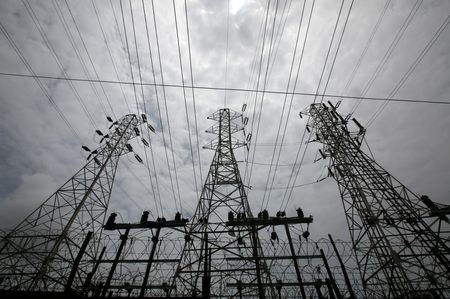By Stephen Culp
NEW YORK (Reuters) – U.S. stocks gathered momentum on Tuesday, while gold reached new highs as global trade jitters kept investors guessing.
All three major U.S. stock indexes strengthened after last-minute negotiations resulted in one-month reprieves on President Donald Trump’s 25% levies against Canada and Mexico.
But safe-haven investors continued to favor gold after a 10% tariff against China went into effect; tariffs which prompted Beijing to announce its own retaliatory tariffs against U.S. energy exports and expand its control over the export of critical minerals.
China also warned Alphabet and other American firms of potential sanctions.
Trump’s trade advisor said the president will speak with Chinese President Xi Jinping later on Tuesday.
“The tariff news is back-and-forth and heightened uncertainty and yet the market seems to want to go up,” said Thomas Martin, Senior Portfolio Manager at GLOBALT in Atlanta.
But Martin does not expect much to be resolved between Trump and Xi.
“I expect there to be more room for continued escalation, because I don’t think the Chinese government is going back down,” Martin added. “They’re still an enemy.”
Data showed U.S. job openings and factory orders both fell more than expected in December, pointing to some economic dampening, but not enough to convince the U.S. Federal Reserve to continue down its rate-cutting path anytime soon.
The Dow Jones Industrial Average rose 163.58 points, or 0.37%, to 44,585.49, the S&P 500 rose 45.32 points, or 0.75%, to 6,039.74 and the Nasdaq Composite rose 249.66 points, or 1.29%, to 19,641.62.
European shares ended a choppy session modestly higher as investor focus shifted to quarterly earnings reports, while anxieties over U.S. tariffs igniting a broader trade war were moved to the back burner.
MSCI’s gauge of stocks across the globe rose 8.18 points, or 0.95%, to 867.51.
The STOXX 600 index rose 0.22%, while Europe’s broad FTSEurofirst 300 index rose 4.51 points, or 0.21%. Emerging market stocks rose 20.87 points, or 1.94%, to 1,094.59. MSCI’s broadest index of Asia-Pacific shares outside Japan closed higher by 1.94%, to 575.37, while Japan’s Nikkei rose 278.28 points, or 0.72%, to 38,798.37.
U.S. 10-year Treasury yields gained ground on the Mexico and Canada tariff delays, while yields on two-year notes, which are tied to the Federal Reserve’s policy moves, dipped after the JOLTS data.
The yield on benchmark U.S. 10-year notes fell 2.8 basis points to 4.513%, from 4.543% late on Monday.The 30-year bond yield fell 2.1 basis points to 4.75% from 4.771% late on Monday.
The 2-year note yield, which typically moves in step with interest rate expectations for the Federal Reserve, fell 5.1 basis points to 4.214%, from 4.265% late on Monday.
The dollar lost ground after duties against Chinese goods took effect.
The dollar index, which measures the greenback against a basket of currencies including the yen and the euro,fell 0.56% to 107.97, with the euro up 0.35% at $1.038.Against the Japanese yen, the dollar weakened 0.29% to154.3.
The Mexican peso <MXN=> weakened 1.01% versus the dollar at 20.551.
The Canadian dollar strengthened 0.79% versus the greenback to C$1.43 per dollar.
In cryptocurrencies, bitcoin fell 1.33% to $100,513.00. Ethereum rose 1.01% to $2,843.53.
Crude prices pared their losses after a U.S. official said President Trump plans to restore his “maximum pressure” campaign on Iran, which would include driving its oil exports down to zero in order to stop Tehran from obtaining a nuclear weapon.
U.S. crude fell 0.63% to $72.70 per barrel, while Brent rose to $76.20 per barrel, up 0.32% on the day.
Gold prices continued to rally, hitting fresh highs as investors flocked to the safe-haven metal.
Spot gold rose 1.06% to $2,843.46 an ounce. U.S. gold futures rose 0.62% to $2,851.40 an ounce.
(Reporting by Stephen Culp; Additional Reporting by Harry Robertson in London; Editing by Alexander Smith and Sandra Maler)








